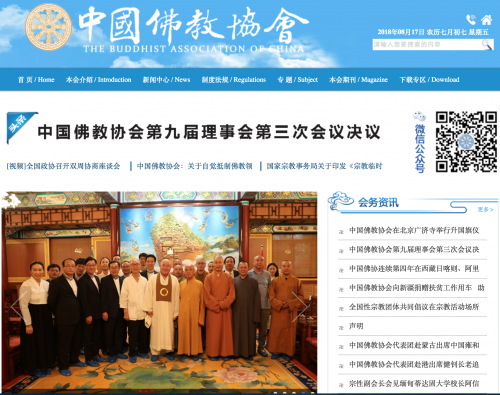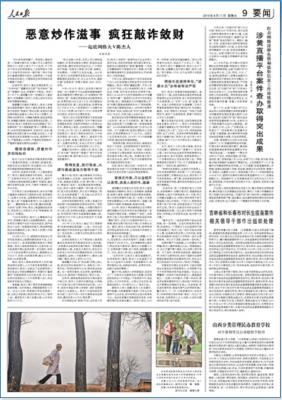Headlines and Hashtags
Chip Claim Fuels Tech Exuberance, Again
This week, unfortunately, we had the return of the forced “confession,” an all-too-familiar trait of criminal justice in the Xi Era, as state media reported that the Hunan blogger Chen Jieren has admitted to cheating the public. An August 16 article on page 9 of the People’s Daily began with Chen’s supposed admission of wrongdoing: “On the surface, I had a bright and clean appearance, a Big V who flew the flag of equality and justice — when in fact I was only out for personal gain, and I did many shady things and acted as an online parasite.”
Also this week, we had yet another case of tech exuberance, as internet users prematurely interpreted an announcement by a Hangzhou-based chip company as a sign of a sudden and historic breakthrough freeing China from European and American obstacles.
This Week in China’s Media
August 11 to August 17
➢ Abbot of Longquan Monastery Removed as Head of Buddhist Association of China Amid Allegations of Sexual Harassment
➢ Xinhua Daily Runs Article Calling for Creation of a “Birth Fund System” to Encourage Under-40s to Have More Children
➢ Chinese Chip Developer Prematurely Touts First 7 Nanometer Chip
➢ Cyberspace Administration of China Organizes New Batch of Websites To Announce Informing Procedures for “Harmful” Content
➢ State Media Condemn Chen Jieren in the Headlines, Response from His Lawyer is Censored
[1] Abbot of Longquan Resigns as Head of Buddhist Association of China Amid Allegations of Sexual Harassment
In early August, two former monks at Beijing’s Longquan Monastery (龙泉寺) posted a 95-page academic-style paper online in which they exposed various rumors within the Buddhist order. Called “Report on Matters of Importance” (重大情况汇报), the paper alleged repeated sexual harassment by the monastery’s abbot, Xuecheng, of numerous nuns. The paper has since been removed from the internet in China. On August 15, the Buddhist Association of China posted a notice to its website saying that a recent conference had decided to accept the resignation of Xuecheng from his post as association president and all other positions in the organization. The notice, which emphasized that the group was guided by “Xi Jinping Thought of Socialism with Chinese Characteristics for the New Era,” made no direct mention of the allegations against Xuecheng, who is a Communist Party member.
Key Chinese Sources:
China Buddhist Association (中国佛教协会网站): 中国佛教协会第九届理事会第三次会议决议
[2] Xinhua Daily Runs Article Calling for Creation of a “Birth Fund System” to Encourage Under-40s to Have More Children
On August 14, Xinhua Daily, the official Party mouthpiece of the CCP provincial committee in Jiangsu province, published an article called “Raising Birth Rates: New Tasks for Population Development in the New Era” (提高生育率:新时代中国人口发展的新任务), which said that the birth rate in China was down 15-20 percent in the first half of 2018, and that in the next 2-3 years China’s birth rate would be in steady decline.
The article advocated the creation of a “Birth Fund System” (生育基金制度), an issue that drew a great deal of attention from online readers. “It could be stipulated that all citizens 40 years of age and younger, whether male or female, must pay a specified portion of their wages into a birth fund, which would enter their personal account. When a family gave birth to their second or any subsequent child, they could apply to withdraw their birth funds and receive a birth subsidy, which could be used to offset income losses to the female or her family during pregnancy. If the citizens did not have a second child, the funds could be withdrawn after retirement.”
Key Chinese Sources:
Xinhua Daily (新华日报): 提高生育率: 新时代中国人口发展的新任务
[3] Chinese Chip Developer Prematurely Touts First 7 Nanometer Chip
Hangzhou-based chip developer Canaan Creative announced on August 8 that it had successfully developed the country’s first 7 nanometer (7 nm) chip. Comments on the WeChat account of the venture capital site Mingin.com were enthusiastic: “One ZTE falls, and thousands of Chinese chip companies will stand up!” “This means that Chinese chips have fully broken through the blockage by Europe and America — a splendid moment of victory for Chinese semiconductor manufacturing, and a historic moment in the development of Chinese science and technology!”
The Mingin post clocked more than 100,000 reads, and was quickly shared by other media on the WeChat platform.
On August 13, Qianjiang Evening News, a local Hangzhou newspaper, cooled off expectations about the domestic 7 nm chip, saying that “China’s high-end chip sector still has a long road to go.” The National Business Daily reported that while China may be able to design a 7nm chip, mainland Chinese enterprises would as yet be unable to mass produce them, and for this would require the services of Taiwanese original equipment manufacturers because advanced laser lithography is still a major bottleneck.
Key Chinese Sources:
WeChat Public Account “Mingin Web” (微信公众号”鸣金网”: 预言成真!今天,杭州打响第一枪!
Qianjiang Evening News (钱江晚报): 生产、设计有落差,中国芯的路还很长
National Business Daily (每日经济新闻): 朱邦凌:应正视7纳米芯片量产背后的行业短板2018-08-14 第02版 洞见
WeChat Public Account “Dai Zi Gui Zhong” (微信公众号”待字闺中”: 中国芯,别再自嗨了
[4] Cyberspace Administration of China Organizes New Batch of Websites To Announce Informing Procedures for “Harmful” Content
New Media (网络传播), a magazine published by the Cyberspace Administration of China (CAC) reported through its official WeChat account on August 16 that the CAC had organized 567 websites to publicly promote newly implemented systems through which members of the public can inform on cases of illegal and harmful information. According to the report, this is actually the fifth batch of websites to announce their reporting systems.
Websites in this group of 567 include news websites, commercial websites, government websites and community forums as well as search engines, online commerce sites, video-sharing platforms. Websites on the list included, for example, the widely-used map site Amap, and the music video and social platform Tik Tok.
The China Center for Reporting of Illegal and Harmful Online Information (中国互联网违法和不良信息举报中心) was formed in August 2005, and in May 2014 was placed under the newly-formed Cyberspace Administration of China.
Key Chinese Sources:
China Center for Reporting of Illegal and Harmful Online Information (中国互联网违法和不良信息举报中心网站): 举报指南
WeChat Public Account “New Media Magazine” (微信公众号”网络传播杂志”): 抖音、拼多多、美团等567家网站公布“举报受理”方式
[5] State Media Condemn Chen Jieren in the Headlines, Response from His Lawyer is Censored
On August 16, Xinhua News Agency, the People’s Daily, The Paper and other state-run news media issued harsh criticisms of the writings of “online celebrity” Chen Jieren (陈杰人), an independent blogger from Hunan province who was arrested in June. The reports alleged that Chen’s crimes were “of the nature of online criminal forces” (网上黑恶势力性质的) with a “clan dynamic” (家族式). Chen was also quoted as having “confessed” his crimes.
“Actually, I cheated you all,” the People’s Daily quoted Chen as saying. “On the surface, I had a bright and clean appearance, a Big V who flew the flag of equality and justice — when in fact I was only out for personal gain, and I did many shady things and acted as an online parasite.”
Chen’s lawyer, Tong Zongjin (仝宗锦), responded to these allegations in a statement posted to his WeChat public account, where it was quickly deleted, though it was shared elsewhere as a long image file. On July 7 this year, authorities in Hunan province announced that criminal compulsory measures (刑事强制措施) were being taken against Chen for “illegal business activities,” “extortion” and other crimes.
Key Chinese Sources:
People’s Daily (人民日报): 恶意炒作滋事 疯狂敲诈敛财——起底网络大V陈杰人
Xinhua News Agency (新华社): 从“网络大V”到“网络害虫”——陈杰人涉嫌敲诈勒索、非法经营罪案件透视
The Paper (澎湃新闻网): 警方披露陈杰人涉嫌敲诈案细节: 银行流水过亿,家族式作案























